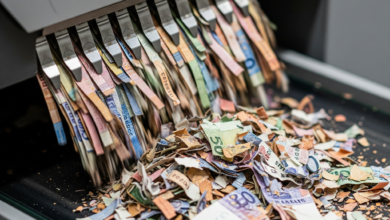Have you ever imagined a world without physical money? No more fumbling for change, no more lost wallets, just seamless digital transactions. While it might sound like something out of a futuristic movie, Sweden is rapidly moving towards this reality, potentially becoming the world’s first cashless society. This shift isn’t just about convenience; it’s a fascinating blend of technological advancement, cultural adoption, and a peek into what financial systems might look like globally in the years to come.
The Digital Pulse: Why Sweden Leads the Cashless Charge

Why is Sweden Ditching Cash? Exploring the Driving Forces Behind a Cashless Economy
Sweden’s journey to a cashless society is driven by several factors. Firstly, there’s a strong cultural embrace of technology and innovation. Swedes are early adopters of new tech, and digital payments fit perfectly into their tech-forward lifestyle. Secondly, the robust banking infrastructure in Sweden has made digital transactions incredibly easy and secure. Mobile payment apps like Swish, which allows instant transfers between bank accounts, have become ubiquitous, used by millions for everything from splitting restaurant bills to paying for goods at a flea market.
Beyond Convenience: The Unseen Benefits of Sweden’s Cashless Trend
While convenience is a major draw, the move away from cash also offers other benefits. For businesses, handling less cash reduces the risk of theft and the costs associated with managing physical money, such as security and transportation. For individuals, digital transactions offer a clear record of spending, which can be helpful for budgeting. Furthermore, a cashless system can potentially reduce the shadow economy and make it harder for illicit activities that rely on untraceable cash.
Navigating the Shift: Challenges and Concerns in a Cash-Free Sweden

Is a Cashless Society Good for Everyone? Addressing Concerns in Sweden’s Digital Payment Push
Despite the advantages, the rapid transition to a cashless society in Sweden isn’t without its challenges and concerns. One of the primary worries is financial exclusion for certain demographics, particularly the elderly or those without access to smartphones or bank accounts. While Sweden has a high rate of digital literacy, ensuring everyone can participate in a cashless economy is a key consideration. There are also concerns about privacy and data security. With every transaction leaving a digital footprint, questions arise about how this data is collected, stored, and used.
The Future of Money: Lessons from Sweden’s Path to a Cashless World
Sweden’s experience offers valuable insights for other countries considering a similar path. It highlights the importance of robust digital infrastructure, widespread public education, and inclusive policies to ensure that no one is left behind. The Swedish central bank, Riksbank, is even exploring the possibility of issuing a digital currency, the “e-krona,” to ensure the state’s role in the monetary system in a cashless future. This initiative demonstrates a proactive approach to adapting to the evolving financial landscape.
Will Your Country Go Cashless Next? What Sweden’s Digital Future Means Globally

The Global Ripple Effect: How Sweden’s Cashless Experiment Could Inspire Other Nations
Sweden’s pioneering efforts serve as a fascinating case study for the rest of the world. While a completely cashless society might still be a distant reality for many nations, the trend towards digital payments is undeniable. Countries worldwide are seeing an increase in card payments, mobile transactions, and online banking. Sweden’s journey provides a blueprint, highlighting both the opportunities and the potential pitfalls of embracing a fully digital monetary system. As technology continues to advance, and as societies become more interconnected, the question of whether we will eventually live in a world without physical cash becomes less of an “if” and more of a “when.” Sweden is simply showing us the way.




